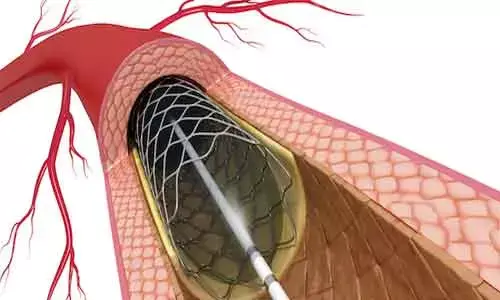- Home
- Medical news & Guidelines
- Anesthesiology
- Cardiology and CTVS
- Critical Care
- Dentistry
- Dermatology
- Diabetes and Endocrinology
- ENT
- Gastroenterology
- Medicine
- Nephrology
- Neurology
- Obstretics-Gynaecology
- Oncology
- Ophthalmology
- Orthopaedics
- Pediatrics-Neonatology
- Psychiatry
- Pulmonology
- Radiology
- Surgery
- Urology
- Laboratory Medicine
- Diet
- Nursing
- Paramedical
- Physiotherapy
- Health news
- Fact Check
- Bone Health Fact Check
- Brain Health Fact Check
- Cancer Related Fact Check
- Child Care Fact Check
- Dental and oral health fact check
- Diabetes and metabolic health fact check
- Diet and Nutrition Fact Check
- Eye and ENT Care Fact Check
- Fitness fact check
- Gut health fact check
- Heart health fact check
- Kidney health fact check
- Medical education fact check
- Men's health fact check
- Respiratory fact check
- Skin and hair care fact check
- Vaccine and Immunization fact check
- Women's health fact check
- AYUSH
- State News
- Andaman and Nicobar Islands
- Andhra Pradesh
- Arunachal Pradesh
- Assam
- Bihar
- Chandigarh
- Chattisgarh
- Dadra and Nagar Haveli
- Daman and Diu
- Delhi
- Goa
- Gujarat
- Haryana
- Himachal Pradesh
- Jammu & Kashmir
- Jharkhand
- Karnataka
- Kerala
- Ladakh
- Lakshadweep
- Madhya Pradesh
- Maharashtra
- Manipur
- Meghalaya
- Mizoram
- Nagaland
- Odisha
- Puducherry
- Punjab
- Rajasthan
- Sikkim
- Tamil Nadu
- Telangana
- Tripura
- Uttar Pradesh
- Uttrakhand
- West Bengal
- Medical Education
- Industry
Lesser risk of recurrent MI with prasugrel than ticagrelor in STEMI patients: Circulation

Germany: The use of ticagrelor versus prasugrel in STEMI patients undergoing primary PCI did not lead to significant differences in incidence of death, stroke or myocardial infarction (MI), a recent study in the journal Circulation has suggested. However, ticagrelor was associated with a significant increase in MI risk.
There is a limited data on the comparative efficacy and safety of ticagrelor versus prasugrel in ST-segment elevation myocardial infarction (STEMI) patients undergoing primary percutaneous coronary intervention (PCI). Alp Aytekin, Cardiology and Technische Universität München, both in Munich, Germany, and colleagues assessed the safety and efficacy of ticagrelor versus prasugrel in a head-to-head comparison in STEMI patients undergoing primary PCI.
The pre-specified subgroup analysis included 1653 patients with STEMI. They were randomized to receive ticagrelor or prasugrel in the setting of the ISAR REACT-5 trial.
The primary endpoint was the incidence of death, myocardial infarction or stroke at 1 year after randomization. The secondary endpoint was the incidence of bleeding defined as Bleeding Academic Research Consortium (BARC) type 3 to 5 bleeding at 1 year after randomization.
Key findings of the study include:
- The primary endpoint occurred in 10.1% in the ticagrelor group and in 7.9% in the prasugrel group (hazard ratio [HR]=1.31).
- One-year incidence of all-cause death (4.9% vs. 4.7%), stroke (1.3% vs. 1.0%) and definite stent thrombosis (1.8% vs. 1.0%) did not differ significantly in patients assigned to ticagrelor or prasugrel.
- One-year incidence of myocardial infarction (5.3% vs. 2.8%; HR=1.95) was higher with ticagrelor than with prasugrel.
- BARC type 3 to 5 bleeding occurred in 6.1% patients in the ticagrelor group and in 5.1% patients in the prasugrel group (HR=1.22).
"Our results showed that in patients with STEMI undergoing primary PCI, there was no significant difference in the primary endpoint between prasugrel and ticagrelor. Ticagrelor was associated with a significant increase in the risk for recurrent myocardial infarction," concluded the authors.
The study, "Ticagrelor or Prasugrel in Patients with ST-Segment-Elevation Myocardial Infarction Undergoing Primary Percutaneous Coronary Intervention," is published in the journal Circulation.
DOI: https://www.ahajournals.org/doi/10.1161/CIRCULATIONAHA.120.050244
Dr Kamal Kant Kohli-MBBS, DTCD- a chest specialist with more than 30 years of practice and a flair for writing clinical articles, Dr Kamal Kant Kohli joined Medical Dialogues as a Chief Editor of Medical News. Besides writing articles, as an editor, he proofreads and verifies all the medical content published on Medical Dialogues including those coming from journals, studies,medical conferences,guidelines etc. Email: drkohli@medicaldialogues.in. Contact no. 011-43720751


